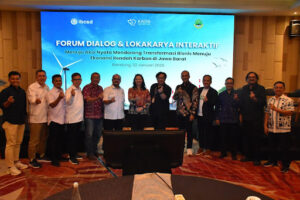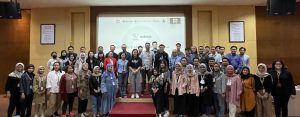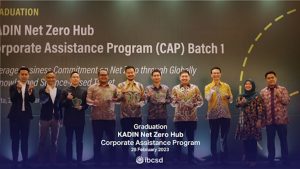Dunia Usaha Jawa Barat Dorong Aksi Nyata Transformasi Menuju Ekonomi Rendah Karbon
IBCSD, KADIN Net Zero Hub, dan BAPPEDA Jawa Barat Perkuat Kolaborasi Dekarbonisasi Industri
Bandung, 22 Januari 2026 — Upaya percepatan transformasi bisnis menuju ekonomi rendah karbon di tingkat daerah terus diperkuat. Indonesia Business Council for Sustainable Development (IBCSD) sebagai sekretariat dari KADIN Net Zero Hub, bekerja sama dengan Badan Perencanaan Pembangunan Daerah (BAPPEDA) Provinsi Jawa Barat, menyelenggarakan Forum Dialog & Lokakarya Interaktif: Menuju Aksi Nyata Mendorong Transformasi Bisnis Menuju Ekonomi Rendah Karbon di Jawa Barat di Bandung, Kamis (22/1).
Provinsi Jawa Barat dinilai memiliki posisi strategis dalam agenda transisi rendah karbon nasional, mengingat perannya sebagai pusat industri dan ekonomi, sekaligus wilayah dengan potensi energi baru dan terbarukan yang besar. Pelaku industri didorong untuk mulai melakukan identifikasi sumber emisi, meningkatkan efisiensi energi, melakukan elektrifikasi proses produksi, serta memanfaatkan energi bersih secara bertahap dan terukur.
Untuk itu, forum ini mempertemukan pelaku industri, pemerintah daerah, dan mitra pembangunan untuk membahas strategi teknis dan langkah implementatif dekarbonisasi sektor industri. Kegiatan ini merupakan bagian dari rangkaian Net Zero Hub Roadshow, yang bertujuan mendorong keterlibatan nyata dunia usaha daerah dalam mendukung target Net Zero Emission Indonesia.
Direktur Eksekutif IBCSD, Indah Budiani, menegaskan bahwa transformasi rendah karbon di sektor industri membutuhkan pendekatan yang aplikatif dan berbasis pada kondisi bisnis riil. “IBCSD berkomitmen untuk tidak berhenti di forum ini. Kami ingin menjadikan hasil diskusi dan lokakarya hari ini sebagai dasar tindak lanjut: pendampingan teknis, pengembangan pipeline proyek dekarbonisasi, serta penguatan kolaborasi antara pemerintah daerah, dunia usaha, dan mitra pembangunan,” ujar Indah.
Selain sesi dialog kebijakan dan paparan narasumber, kegiatan ini juga dilengkapi dengan lokakarya teknis yang dipandu oleh WRI Indonesia, sebagai salah satu knowledge partner KADIN Net Zero Hub. yang mendorong partisipasi aktif peserta dalam memetakan sumber emisi dan mengidentifikasi tuas dekarbonisasi yang relevan dengan proses bisnis masing-masing perusahaan.
Salah satu peserta forum, Bhirowo H, HSE PT Biofarma, menilai bahwa forum ini sangat bermanfaat. “Sebagai perusahaan yang bergerak di sektor farmasi dan berorientasi ekspor, tuntutan dari buyer terkait sustainability dan target penurunan emisi sudah mulai nyata. Melalui forum ini, kami jadi lebih memahami Scope 1, 2, dan 3. Transisi rendah karbon tidak bisa dilakukan sendiri dan membutuhkan kolaborasi lintas sektor,” ungkapnya.
Founder KADIN Net Zero Hub, Syarika Bralini, menekankan pentingnya peran dunia usaha daerah dalam pencapaian target iklim nasional. “Transformasi menuju industri rendah karbon bukan lagi pilihan, melainkan imperatif strategis agar perusahaan tetap relevan, tangguh, dan kompetitif. Melalui KADIN Net Zero Hub, kami mendorong dunia usaha tidak berhenti pada komitmen, tetapi membangun kapasitas nyata, mulai dari inventarisasi emisi, efisiensi energi, hingga implementasi solusi yang terukur dan dapat dijalankan di level operasional,” jelas Syarika.
Dari sisi pemerintah daerah, Kepala BAPPEDA Provinsi Jawa Barat, Dedi Mulyadi, yang diwakili oleh Eka Jatnika Sundana selaku Kepala Bidang Perekonomian dan Sumber Daya Alam BAPPEDA Provinsi Jawa Barat menyampaikan bahwa kolaborasi dengan dunia usaha merupakan kunci keberhasilan pembangunan rendah karbon di Jawa Barat. “Pemerintah Provinsi Jawa Barat membuka ruang kolaborasi seluas-luasnya dengan sektor industri. Transformasi menuju ekonomi rendah karbon harus berjalan seiring dengan pertumbuhan ekonomi dan peningkatan daya saing daerah, dan hal ini hanya dapat dicapai melalui sinergi kebijakan dan aksi nyata dunia usaha,” tegasnya.
Melalui forum ini, IBCSD, KADIN Net Zero Hub, dan BAPPEDA Jawa Barat berharap lahir komitmen dan rencana aksi konkret dari perusahaan-perusahaan di Jawa Barat untuk mempercepat adopsi solusi rendah karbon. Ke depan, hasil diskusi dan lokakarya akan menjadi pijakan awal untuk penguatan kolaborasi lanjutan dalam mendorong pertumbuhan ekonomi hijau yang inklusif dan berkelanjutan di Jawa Barat.
Kontak Media:
Nurina Izazi, Communications and Member Relations, [email protected]
Caption foto:
|
Perwakilan dari IBCSD, Pemerintah Provinsi Jawa Barat, Kadin Net Zero Hub, WRI Indonesia, Kadinda Jawa Barat saat menghadiri acara Forum Dialog dan Lokakarya Interaktif (22/01) |
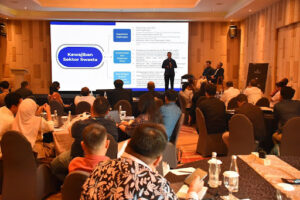
Aloysius Wiratmo, Program Director IBCSD, memberikan paparan tentang mengapa sektor swasta perlu memulai perjalanan menuju net-zero |
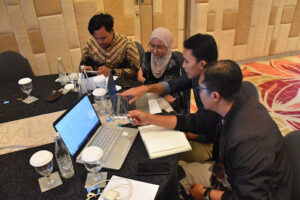
Peserta lokakarya belajar identifikasi emisi perusahaan berdasarkan Scope 1, 2, dan 3 |
